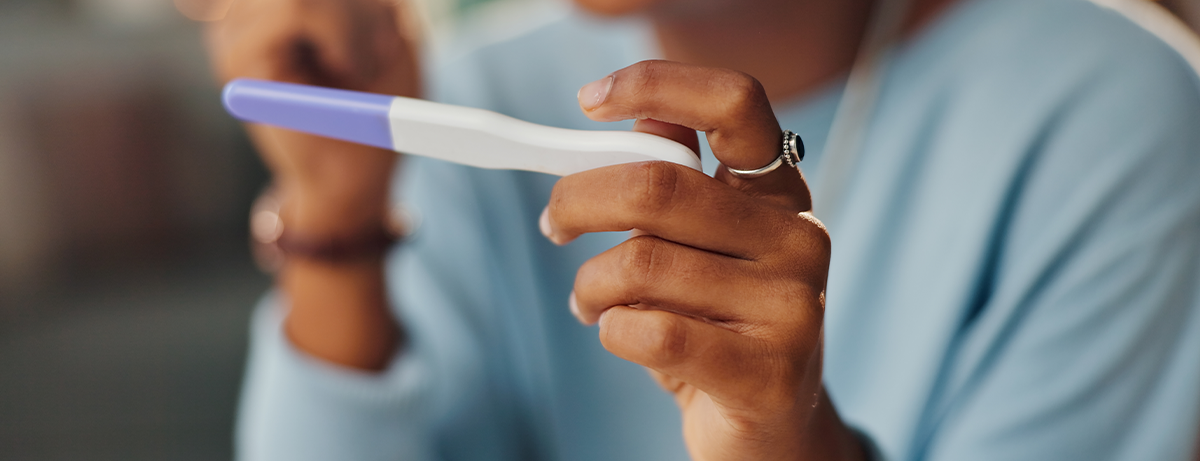15% off £25 or 20% off £35
Code:BASKET
How to recognise early (or premature) menopause and what to do next

Hot flushes, brain fog, vaginal dryness, mood changes – these are all classic menopause symptoms. But are you experiencing them sooner than expected?
Summary
1Signs of early and premature menopause
Irregular periods or a complete stop in menstruation before the age of 45 or 40 are the main symptoms...
2Why early and premature menopause can happen
Unfortunately, in most cases (90% of women), the cause of early and premature menopause is unclear...
3Treatments and support for early and premature me
Hormone replacement therapy (HRT) is the current recommended treatment by doctors for most women...
Menopause is a natural milestone in every woman’s life but it doesn't always follow the rulebook. It marks the point when your periods stop (defined as no periods for 12 consecutive months) and you can no longer get pregnant.1-3 Most women experience menopause between 45 and 55, with 51 being the average in the UK.1-5
For some women, menopause can arrive earlier than expected, known as early or premature menopause.4,6
Wondering if this could happen to you? Here’s everything you need to know – from the difference between early and premature menopause to symptoms, causes and treatments.
What’s the difference between early and premature menopause?
Early menopause and premature menopause are both terms used to describe menopause that occurs outside of the typical age range of 45 to 55.6
The key difference? It’s all about the age at which your periods permanently stop (12 consecutive months without a period, including any spotting):4,6
- early menopause happens before 45
- premature menopause occurs before 40 (also called premature ovarian insufficiency or POI)
Early menopause is estimated to affect around 5% of women, while premature menopause impacts approximately 1% of those under 40 and 0.1% of those under 30.1,7
Signs of early and premature menopause
Irregular periods or a complete stop in menstruation before the age of 45 or 40 are the main symptoms of early or premature menopause.6,8
That said, it’s important to remember that if you’re taking hormonal contraception, you may not notice any change in your menstrual cycle, so other symptoms could be your only clue.7
Other key signs and symptoms you may experience with early or premature menopause include:6,8,9
- hot flushes and night sweats
- vaginal dryness and discomfort
- difficulty sleeping
- palpitations (fluttery heartbeat)
- mood changes
- low mood, depression or anxiety
- reduced libido (low sex drive)
- brain fog and problems with memory or concentration
- joint pain
While these symptoms are the same as those you might experience in menopause over the age of 45, they can feel more intense if menopause happens earlier.10
If you’re experiencing any of these symptoms, it’s important to talk to your healthcare provider to find out if early or premature menopause could be the cause.
Why early and premature menopause can happen
Unfortunately, in most cases (90% of women), the cause of early and premature menopause is unclear.7
However, certain factors may increase your risk, including:6
- a family history of early or premature menopause
- starting your period at a young age
- smoking
- low body weight (being underweight can affect hormone levels)
Certain medical or surgical treatments and health conditions can also trigger early or premature menopause. These include:1,6,8,10
- radiotherapy or chemotherapy to treat cancer
- certain hormone medications
- bilateral oophorectomy (surgical removal of both ovaries)
- hysterectomy (only if ovaries are removed)
- autoimmune conditions, such as thyroid disease and rheumatoid arthritis
- viral infections, such as mumps
- human immunodeficiency virus (HIV) and acquired immunodeficiency syndrome (AIDS)
- chromosome abnormalities and genetic disorders, such as Turner syndrome and fragile X syndrome
- myalgic encephalomyelitis/chronic fatigue syndrome (ME/CFS)
While the exact cause isn't always clear, knowing these risk factors can help you stay informed and proactive about your wellbeing.
Treatments and support for early and premature menopause
Hormone replacement therapy (HRT) is the current recommended treatment by doctors for most women experiencing early or premature menopause.6,7
By replacing low hormone levels, HRT helps to ease menopause symptoms like hot flushes, brain fog, mood changes and vaginal dryness.8-11 It can also support long-term health by reducing your risk of menopause-related health complications, such as osteoporosis and heart disease.7
Another common treatment for early or premature menopause is the combined contraceptive pill.6 However, HRT is likely to be more beneficial in terms of bone and heart health. It’s best to speak to your doctor to work out what is suitable for you.6,7
Other treatments that may help manage your menopause symptoms include:1,11
- Medicines, such as blood pressure and epilepsy medication, to reduce hot flushes and night sweats
- oestrogen tablets, creams or gels to relieve vaginal dryness and discomfort
- antidepressants to treat depression or anxiety
- cognitive behavioural therapy (CBT) for low mood and anxiety, as well as some physical symptoms like hot flushes and joint pain

Complementary therapies like meditation and aromatherapy, as well as some herbal remedies such as evening primrose oil and black cohosh, have been used traditionally.11-13 However, it’s worth noting that these therapies and herbal remedies aren’t supported by scientific evidence and more research is needed around how they could help.11,12
There's no one-size-fits-all approach, so speak to your healthcare provider to find what works best for you.
The health impacts of early and premature menopause
If you’re experiencing early or premature menopause, it’s more than likely to come as a complete shock, so it’s understandable if your mental health has taken a knock.
Beyond the mental and emotional impact, menopause can also bring physical changes that may increase your risk of developing cardiovascular disease and osteoporosis over time.6,10
In early or premature menopause, your body’s ability to produce eggs will likely stop, making getting pregnant more challenging. You may be able to get pregnant with the help of IVF, using either your own frozen eggs or donor eggs, but this isn’t always possible.6
If you need support – whether it’s with managing your mental wellbeing, physical health or your fertility – don’t be afraid to reach out to your healthcare provider. They’re there to provide you with the information, advice and treatment you need to feel your best and live a healthy life.
The final say
Going through menopause sooner than you expected can truly shake things up, but remember – you’re not alone, and help and support are available.
Looking for inspiration from women who've been there, done that? Discover unexpected reasons to feel good (or at least better) about midlife changes – straight from those who've walked this road before.
Disclaimer - This article provides informational advice and is not a substitute for medical care. Curated by experts for accuracy, we take great care to ensure the information is up-to-date and relevant. However, you should always consult your GP or healthcare professional before using supplements or alternative products, particularly if you have medical conditions or are under supervision.
1. Peacock K, et al. Menopause. Treasure Island (FL): StatPearls Publishing; 2023. Available from: https://www.ncbi.nlm.nih.gov/books/NBK507826/
2. World Health Organization. Menopause [Internet]. [cited 2025 Mar 28]. Available from: https://www.who.int/news-room/fact-sheets/detail/menopause
3. British Menopause Society. What is the menopause? [Internet]. [cited 2025 Mar 28]. Available from: https://thebms.org.uk/wp-content/uploads/2023/08/17-BMS-TfC-What-is-the-menopause-AUGUST2023-A.pdf
4. NICE. Menopause [Internet]. [cited 2025 Mar 28] Available from: https://cks.nice.org.uk/topics/menopause/
5. NHS. Menopause [Internet]. [cited 2025 Mar 28]. Available from: https://www.nhs.uk/conditions/menopause/
6. NHS. Early or premature menopause [Internet]. [cited 2025 Mar 28]. Available from: https://www.nhs.uk/conditions/early-or-premature-menopause/
7. NHS Inform. Early and premature menopause [Internet]. [cited 2025 Mar 28]. Available from: https://www.nhsinform.scot/healthy-living/womens-health/later-years-around-50-years-and-over/menopause-and-post-menopause-health/early-and-premature-menopause/
8. MSD Manuals. Premature menopause [Internet]. [cited 2025 Mar 28]. Available from: https://www.msdmanuals.com/home/women-s-health-issues/menstrual-disorders-and-abnormal-vaginal-bleeding/premature-menopause
9. NHS. Menopause - symptoms [Internet]. [cited 2025 Mar 28]. Available from: https://www.nhs.uk/conditions/menopause/symptoms/
10. Office on Women’s Health. Early or premature menopause [Internet]. [cited 2025 Mar 27]. Available from: https://womenshealth.gov/menopause/early-or-premature-menopause
11. NHS. Menopause - Treatment [Internet]. [cited 2025 Mar 28]. Available from: https://www.nhs.uk/conditions/menopause/treatment/
12. NHS. Herbal remedies and complementary medicines for menopause symptoms [Internet]. [cited 2025 Mar 28]. Available from: https://www.nhs.uk/medicines/hormone-replacement-therapy-hrt/alternatives-to-hormone-replacement-therapy-hrt/herbal-remedies-and-complementary-medicines-for-menopause-symptoms/
13. Johnson A, et al. Complementary and alternative medicine for menopause. J Evid Based Integr Med. 2019;24:2515690X19829380. https://doi.org/10.1177/2515690X19829380














